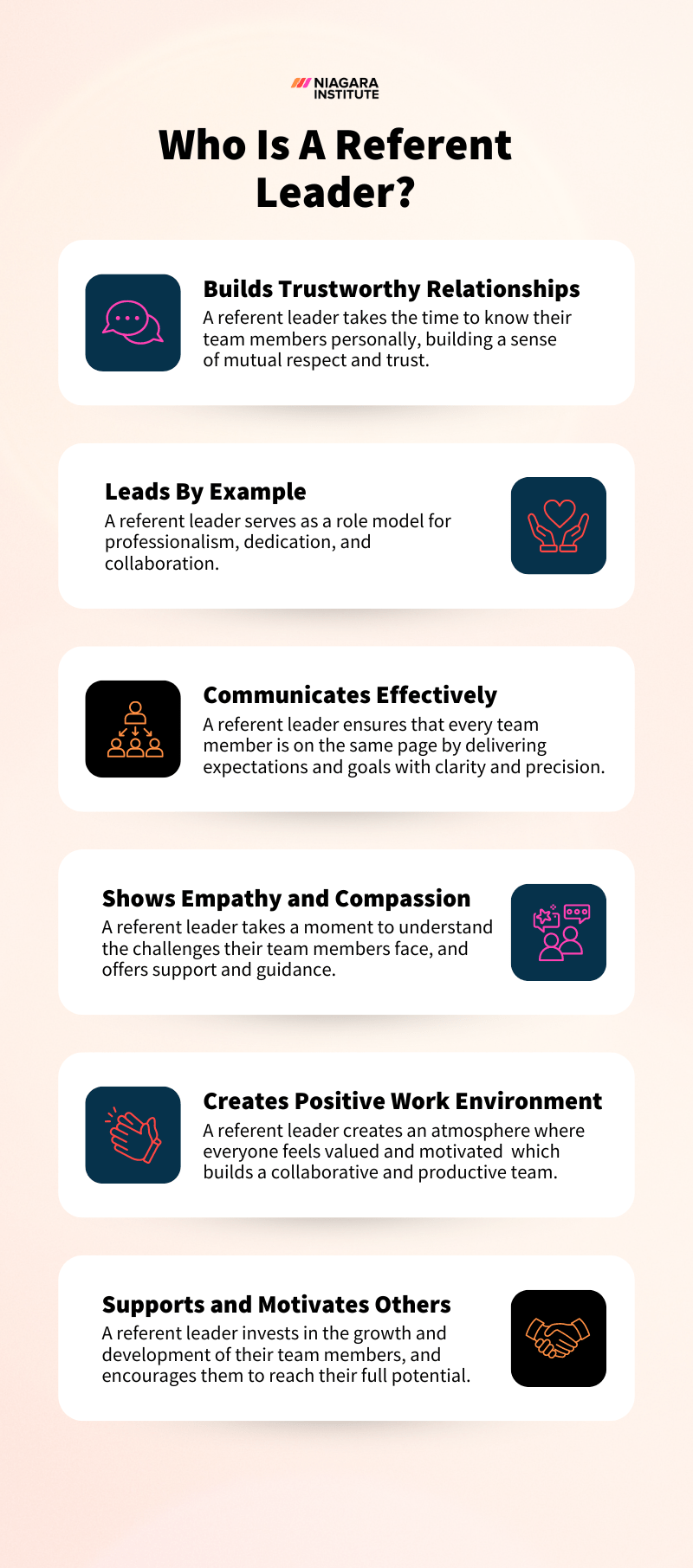8 min read
20 Management Styles: A Quick Reference Guide
No two managers are exactly the same. Our personalities, experiences, and access to leadership development opportunities shape how we choose to...

Have you ever noticed how some people just have that magnetic pull?
You may have met individuals in your workplace whom you deeply admire and see as role models or mentors.
You follow them not because of their title or because they hold a higher position, rather you admire them or identify with them and wish to emulate their qualities.
This is simply because they have referent power.
Table of Contents
The idea of referent power comes from the thoughtful work of social psychologists John French and Bertram Raven.
It is a concept in social psychology and leadership theory that refers to the ability of an individual to influence others based on their personal charisma, likability, and attractiveness.
Referent power arises from the admiration, respect, or identification that followers have for the person who possesses it. Unlike other forms of power in the workplace, such as reward or coercive power, which rely on the ability to offer rewards or punishments, referent power is more about the personal qualities of the individual.
It is often associated with charismatic leaders who have a strong ability to inspire and motivate others.
Expert power and referent power are two types of power that individuals can possess within an organization or social setting.
Both expert and referent power are considered more positive forms of power compared to coercive or reward power, as they are based on respect and admiration rather than fear or dependency. However, they differ in their sources:
Expert power is derived from an individual's expertise, skills, or knowledge in a specific area. People who possess expert power are often highly respected and trusted for their judgement and advice in their field of expertise.
Referent power, on the other hand, comes from the personal qualities, traits, or charisma of an individual. It is based on the admiration, respect, or affection that others have for the person.
Referent power is particularly important in situations where formal authority is lacking or unclear.
Leaders who possess strong referent power can effectively mobilise and motivate others, even in the absence of traditional sources of authority.
At its core, referent power stems from the admiration, respect, and trust that followers have for their leader. It's the kind of power that isn't derived from titles or positions but rather from personal qualities and charisma.
So, why is referent power so vital in the workplace?
Leaders who possess referent power can motivate and inspire their team members by setting a positive example and demonstrating shared values. This can lead to increased engagement, productivity, and morale.
Referent power enables leaders to influence others not through coercion or formal authority, but through their personal relationships. This form of influence is often more effective and sustainable, as it is based on genuine respect and admiration.
Leaders with referent power are often admired and respected, which helps build trust between them and their team members. Trust is a critical component of effective leadership, as it fosters open communication and collaboration.
Leaders with strong referent power are often seen as fair and approachable, making it easier for them to mediate conflicts and maintain harmony within the team.
Leaders who use their referent power to create a supportive and inclusive workplace can foster a positive team culture that attracts and retains top talent.
When managers have referent power over coworkers and subordinates, they are often seen as role models or mentors. Their influence over others stems from the trustworthiness, integrity, and likability they have built.
Followers may simply be willing to comply with the requests or directives of referent leaders simply because they admire or identify with that person and want to emulate them.
The thing is, referent power is not exclusive to leaders or managers; anyone on the team can possess it.
If you use referent power in the workplace effectively, you can enhance your referent power in the workplace, making you a more effective and influential leader.
Here are simple ways to improve and use your referent power and influence others in the workplace:
Individuals with referent power uphold high ethical standards and are consistent in their words and actions. They build trust among team members through their honesty, fairness, and reliability.
So, invest time and effort in building genuine connections with colleagues and team members.
Show interest in their well-being and professional growth.
QUIZ: Are You Giving Employees Reasons To Trust And Respect You?
Referent leaders lead by example. They embody the values and behaviours they expect from their team members, serving as role models for professionalism, dedication, and collaboration.
They communicate clearly and openly, making sure everyone understands their expectations and goals.
To become a role model in the workplace, demonstrate the behaviour, work ethic, and values you want to see in your team. People are more likely to follow and respect someone who practises what they preach. For this, stay true to your values and beliefs.
Model the behaviour, work ethic, and values you want to see in your team. Leading by example is a powerful way to influence and inspire others.
Referent individuals excel in both the non-verbal and verbal communication. They are skilled at articulating their ideas clearly, actively listening to their team members, and fostering open and honest dialogue within the team.
Leaders with referent powers provide support and encouragement to their team members, helping them grow and succeed.
To communicate effectively, learn how to listen. Clear and empathetic communication can build trust and strengthen your influence.
People who hold referent power show a deep understanding of their team members' emotions, perspectives, and concerns.
Their empathy in leadership allows them to connect with their team on a personal level and build strong relationships based on trust and mutual respect.
To practise empathy, understand and relate to the emotions and perspectives of others. Being empathetic can help you build rapport and strengthen your referent power.
Individuals with referent power have a natural charm and presence that makes them appealing to their team members.
Display confidence in your abilities and decisions, but also remain humble and open to learning from others to be a better team leader. This balance fosters respect and admiration.
Confidence in your abilities can inspire others, but it's also important to remain humble and open to learning from those around you. Team members feel comfortable around referent individuals since they are approachable and easy to get along with.
A positive environment can enhance your referent leadership.
People with referent power have a high level of emotional intelligence. This allows them to understand and manage their own emotions in the workplace effectively while also empathising with the emotions of others.
This emotional awareness enables them to manage and resolve conflicts with sensitivity.
To achieve a positive work environment, create a workplace culture that is inclusive, supportive, and motivating.
People are more likely to be inspired by leaders who invest in their success.
Referent leaders genuinely care about the well-being and development of their team members. They provide support, encouragement, and mentorship, helping their team members grow both personally and professionally.
To build referent power, try to encourage team members to take initiative and provide them with opportunities for growth and development.
Motivate team members to take initiative and provide them with the resources and support they need to succeed. Empowering others can enhance your influence and leadership.
Referent leaders are well-liked and respected by their team members due to their approachable nature, positive attitude, and genuine concern for their team performance, success and happiness.
They maintain a positive attitude, even during challenging times like conflicts at work, which helps uplift the team's spirits.
To become more approachable as a leader in the workplace, actively listen to your team members, give constructive feedback, and maintain an open-door policy that encourages them to share their thoughts and ideas.

Understanding whether you possess referent power as a leader is the first step towards improving your leadership journey.
Take this quiz to assess your current level of influence and the dynamics of your relationships in the workplace.

8 min read
No two managers are exactly the same. Our personalities, experiences, and access to leadership development opportunities shape how we choose to...

5 min read
What do you do when you feel a strong emotional response to a situation, decision, or encounter in the workplace? Do you bottle it up? Wish it away?...

6 min read
Buzzfeed asked their community of readers to share stories of their best bosses and what made them so great. In the article, there was a common...